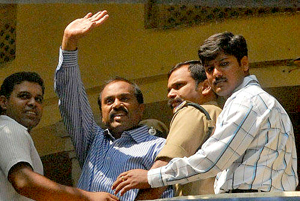 Bangalore, Oct 10: It's rather ironic that former Karnataka tourism minister G Janardhana Reddy is cooling his heels in Hyderabad's Chanchalguda prison, considering that it was close business links with Andhra Pradesh that brought him untold riches.
Bangalore, Oct 10: It's rather ironic that former Karnataka tourism minister G Janardhana Reddy is cooling his heels in Hyderabad's Chanchalguda prison, considering that it was close business links with Andhra Pradesh that brought him untold riches.
Reddy, who controlled a three-tier system spanning the entire operation of illegal iron ore mining from excavation to the wharfs of Belekeri port, used fake permits from Andhra Pradesh to carry out his operations.
"Reddy's associates, including Swastik Nagaraj and Kharapudi Mahesh, were delivering envelopes containing fake permits of the Andhra Pradesh department of mines and geology, forest permits, invoices, et al for the transportation of illegal ore to Belekeri port during January 1, 2009 to May 31, 2010," according to a chargesheet filed by the Central Bureau of Investigation (CBI) before the special CBI court here.
The document reveals that racketeers created firms, including Shafia Minerals, Manjunatheswara Minerals, in the names of their employees and relatives and printed invoices in their names which they used to give to trucks carrying illegal material, along with fake permits.
"Such firms were opened at the behest of Janardhana Reddy and his personal assistant Mehfuz Ali Khan and huge amounts were routed through the accounts of the said firms...which finally reached Reddy," the CBI has charged.
Pointing out that Ali Khan, Reddy's main accomplice, was managing excavation, weighing and dispatch of illegally extracted ore from various mines, CBI sources said Khan would threaten mine owners and forcibly take away ore they'd mined.
"He was also threatening officials from the forest department, DMG and police among others when they raised objections against illegal extraction/transportation of ore carried out on behalf of Reddy," the chargesheet says.
Janardhana Reddy was not only illegally mining iron ore but extorted money from others involved in the trade. His aides Khan, Mahesh and Nagaraj were in charge of collecting money from trucks carrying ore mined illegally by others. "They collected about Rs 200 per MT (tonne) from each truck carrying illegally extracted ore for arranging safe passage of the trucks for transit to Belekeri," the chargesheet says.






Comments
Add new comment